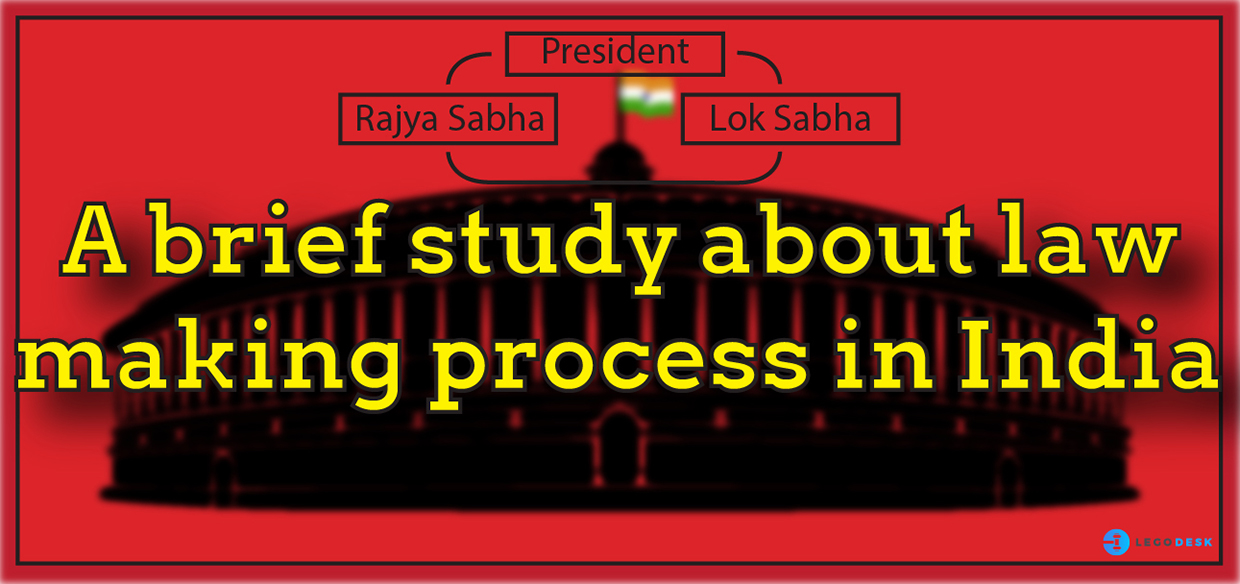
It is a well-known fact that Laws are made for the social needs, Improvement of Society and to remove Illegal Practices and other social problems. In India, our constitution provides the law-making procedure in the Indian Parliament or Legislation. The primary function of the Parliament is to make, fresh laws and to revise or abrogate existing laws. However, sometimes the laws are subject to Judicial Review.
If you ever need to dig deeper on the topic, you can order an essay from an admission essay writing service; contrary to the name, they provide law papers as well. They can help you crack any topic, even law making process in India.
A BRIEF IDEA ABOUT THE LAW MAKING PROCESS IN INDIA
First, in foremost based on the topic, the Government forms Research Committee, this R.C after the intensive research comes out with recommendations which are sent back to the Govt. The approved recommendations are then given to the Ministry of Law and Justice, which drafts the bill. Once the bill drafted, the same is kept in the public domain. The suggestions are incorporated into a revised bill. Then this bill is given to the parliament which when passed, becomes an act. This act is to be signed in 75 days by the president and then published in Official Gazette and the law is made which may be implemented by the date prescribed in O. Gazette.

Read Also: Who is a Gazetted Officer?
FORMAL PROCESS OF MAKING A LAW.
The process started with the need for any fresh law or need of amendment in any existing law.
This may be done by the government or by people’s groups who are living in society and who can swell public awareness in regards to the entail of law.
After the requirement of law, the concerned ministry drafts a ‘bill’ which is containing the desired law. This bill is disseminated to other relevant ministries for modifications and changes they deem fit in it. It is also induced to the public to take comments from the people. The draft is reappraised to subsume such modifications and changes and is then whetted by Law Ministry and after that presented to the Cabinet for approval and when the cabinet approves the bill, it is introduced in either house of the parliament. Now there are 3 Readings of the bill in both the houses i.e. Lok Sabha and Rajya Sabha.
Reading 1
In First Reading, a bill is introduced in Parliament. Maybe the Intro is opposed and consider for the voting in the house but it very rarely happens that any debate is taken place during this stage. But members may oppose the bill if there is any sufficient ground to oppose. For example, If the bill openly violates the Constitution of India.
Reading 2
After the introduction of the bill, the presiding officer i.e. Speaker in Lok Sabha and Chairmen in Rajya Sabha, may refer the bill to the standing committee for examination and take suggestions from that Committee like Committee of Environment and forest has invited suggestions on Civil Liability on Nuclear Damage Bill,2010.
Then it may be sent to the joint select committee of the two houses and then it may be circulated for eliciting public opinion.
During second reading members may amend the bill based on standing committee recommendations. However, Govt. is not bound to accept recommendations.
Reading 3
During third reading(passing) the house votes on the redrafted bill. If passed in one house, it is sent to the second house where it goes through 2nd and 3rd readings again. The other house may reject the bill and may the deadlock happened.
Conditions of deadlock:-
1) One house passed the bill and the other rejected. [Art 108 (1) a]
2)When one house passes the bill and other houses also passed but with an amendment and that amendment is rejected by the first house.[Art 108 (1) b]
3) If more than 6 months elapse from the date of reception of the bill by the other house without the bill being passed by it. [ Art 108 (1) c]
When the deadlock happened, a joint sitting of both the houses is organized and that is dissolved by majority votes.[ Art 108]
After both houses of the Parliament passed the bill, it is presented to the President for assent who have the right to seek info about the bill and also have the power to return the bill to the parliament for reconsideration.
But only one time the president can return it and if both the houses pass it again, then the president is bound to assent.[Art 111]
After assenting of the president, the bill is notified as an act as well as the bill is brought into the force and rules and regulations are made by the executives who implement the act and tabled in parliament. Also, if any demerit seems in the act then it is sent for Judicial Review.
In my opinion, the law-making process in India is very slow because of the debate session which is happened in 2nd Reading in Parliament. We have to improve it and then we are able to draw good and needed laws rapidly and on time.


Gourav
November 5, 2018It really helpful for pubic